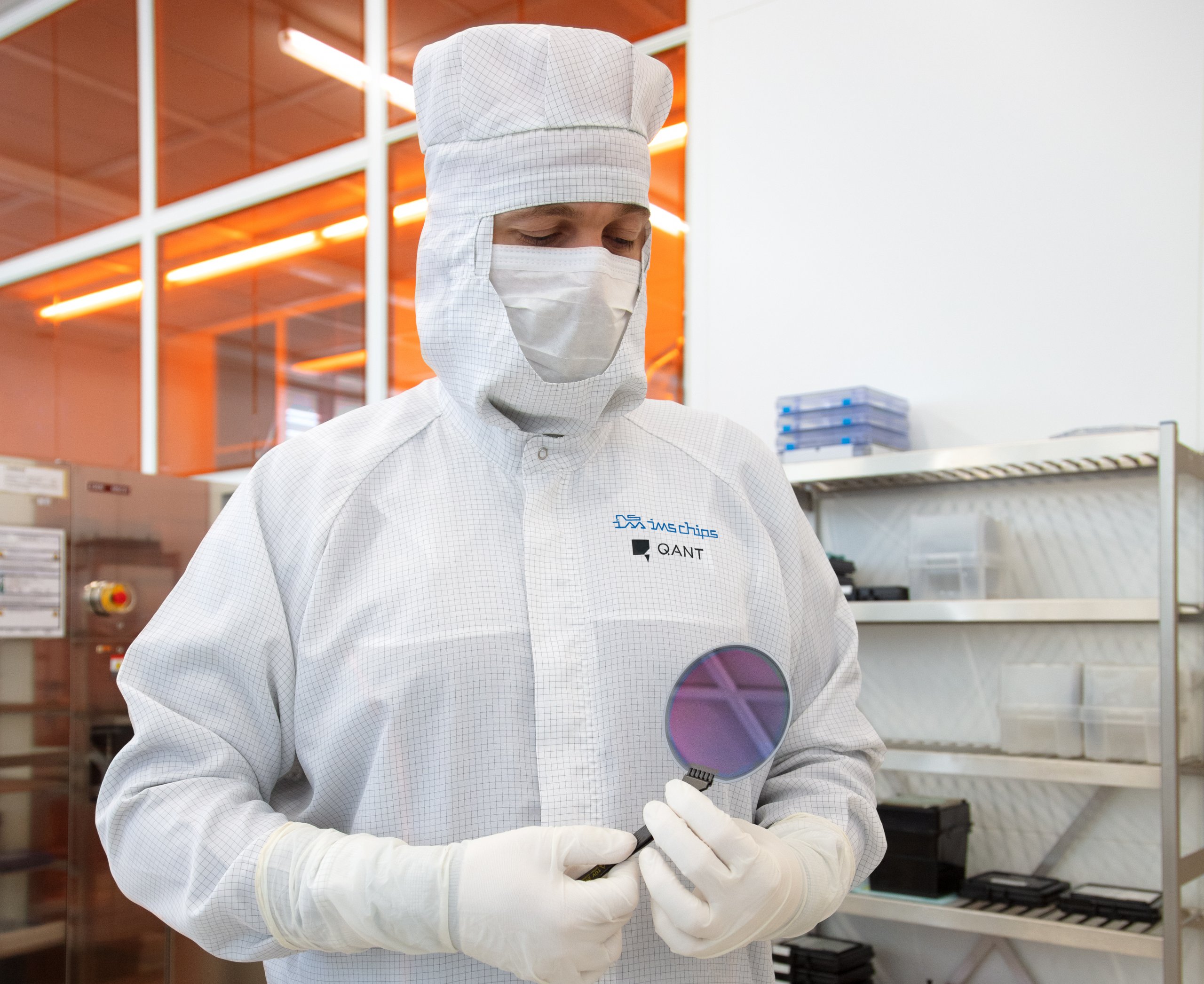Stuttgart-based start-up Q.ANT and the Institute for Microelectronics Stuttgart (IMS CHIPS) have signed an agreement to jointly manufacture quantum chips. The chips, which operate on the basis of light, are expected to be used in various industries, including medical technology, sensor technology, telecommunications, cryptography, logistics, and the financial sector. Q.ANT’s photonic chips operate at room temperature, simplifying integration into existing computing architectures. The company relies on a specially developed technology platform with the material lithium niobate, which has good electro-optical properties for the photonic approach to quantum computing.
Q.ANT and IMS CHIPS Collaborate on Quantum Chip Fabrication
Stuttgart-based start-up Q.ANT and the Institute for Microelectronics Stuttgart (IMS CHIPS) have signed an agreement to jointly manufacture quantum chips. The chips for quantum processors are expected to be produced in small batches within two years. Q.ANT is contributing its expertise in quantum computer chip production, as well as machines and process technology in an initial investment worth €14 million. IMS CHIPS is participating with its existing machinery.
The collaboration aims to set up a complete, series-targeted chip manufacturing facility in Stuttgart. Initially, small-scale production of quantum chips will cover the companies’ own demand for chips for quantum processor developments. However, they plan to offer the chips on the market in large-scale production in the future.
IMS CHIPS brings clean room production with appropriate equipment and experts with experience in industrial-scale manufacturing to the cooperation. In return, Q.ANT invests in manufacturing capacity and equipment geared towards quantum technologies. The collaboration offers the opportunity for IMS, a foundation of the state of Baden-Württemberg, to advance research and development activities.
Quantum Chips for Various Industries
Quantum chips, which operate based on light, are expected to be used in various industries in the future. The fields of application range from medical technology, sensor technology, and telecommunications to cryptography, logistics, and the financial sector.
Unlike many other quantum computing solutions that operate at cryogenic temperatures up to -273°C, Q.ANT’s photonic chips operate at room temperature. This significantly simplifies integration into existing computing architectures. Q.ANT relies on a specially developed technology platform with the material lithium niobate, which is well-suited for the photonic approach to quantum computing due to its good electro-optical properties.
About Q.ANT
Q.ANT is a high-tech start-up in the field of quantum technology, founded in 2018 as part of the TRUMPF Group. The company works on technologies for data generation and data processing, developing quantum sensors and quantum computer chips. With its four product lines, Q.ANT is a partner for a wide variety of industries and fields of application, ranging from medical technology and autonomous driving to aerospace, mechanical engineering, and process technology. Q.ANT employs around 80 people at its Stuttgart site.
About IMS CHIPS
The Institute for Microelectronics Stuttgart conducts business-oriented research in the field of microelectronics in silicon photonics, integrated circuits and systems, nanostructuring, and MEMS. It is a foundation under civil law recognised as a non-profit organisation and is located on the Stuttgart-Vaihingen research campus. The institute is a member of the Baden-Württemberg Innovation Alliance (innBW), a cooperation of ten contract research organisations in Baden-Württemberg with a total of twelve institutes.
“Together, Q.ANT and IMS CHIPS are setting up a complete, series-targeted chip manufacturing facility in Stuttgart. We are starting small-scale production of quantum chips to initially cover our own demand for chips for our developments for quantum processors. In the future, however, we would also like to offer the chips on the market in large-scale production,”
Michael Förtsch, Managing Director of Q.ANT.
“This cooperation is an important contribution to the research initiatives in Germany and especially in the state of Baden-Württemberg. Through the cooperation, we ensure connectivity to the age of quantum technology,” explains Prof. Dr. Joachim Burghartz, director and CEO of the Institute for Microelectronics Stuttgart.
Executive Summary
Stuttgart-based start-up Q.ANT and the Institute for Microelectronics Stuttgart (IMS CHIPS) have partnered to manufacture quantum chips, aiming for small-scale production within two years. The chips, which operate at room temperature, have potential applications in industries such as medical technology, telecommunications, and finance.
- Stuttgart-based start-up Q.ANT and the Institute for Microelectronics Stuttgart (IMS CHIPS) have signed an agreement to jointly manufacture quantum chips.
- The chips for quantum processors are expected to be produced in small batches within two years.
- Q.ANT is contributing machines and process technology in an initial investment worth €14 million, while IMS CHIPS is participating with its existing machinery.
- Quantum chips are central building blocks for quantum processors, which will provide a speed advantage in high-performance computing centres.
- Michael Förtsch, Managing Director of Q.ANT, states that they aim to offer the chips on the market in large-scale production in the future.
- The chips, which operate on the basis of light, are to be used in various industries, including medical technology, sensor technology, telecommunications, cryptography, logistics, and the financial sector.
- Q.ANT’s photonic chips operate at room temperature, simplifying integration into existing computing architectures.
- The company relies on a specially developed technology platform with the material lithium niobate, which has good electro-optical properties for the photonic approach to quantum computing.

